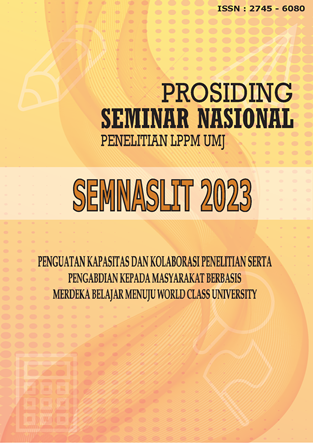KARAKTERISTIK ASAM LEMAK BERNILAI EKONOMI DARI KULTIVASI MIKROALGA HUTAN BAKAU INDONESIA
Abstract
Mikroalga Aurantiochytrium merupakan sumber potensial asam lemak yang bernilai tinggi serta bermanfaat untuk kesehatan tubuh manusia dan hewan. Tulisan ini menyajikan karakteristik asam lemak tak jenuh yang dihasilkan dari ekstrak mikroalga Aurantiochytrium strain lokal Indonesia, Isolat mikroalga diperoleh dari isolasi di hutan bakau Kulon Progo, Yogyakarta. Dari hasil Gas Chromatrography-Mass Spectrometry menunjukkan profil asam lemak didominasi oleh 43% asam stearat, 11% asam pentadekanoat dan 7% 9-Octadecenal. Hasil diskusi membahas potensi pemanfaatan dalam industri makanan, farmasi, dan pakan hewan. Karakteristik unik Aurantiochytrium dalam memproduksi asam lemak tak jenuh menyoroti potensinya sebagai sumber yang berharga untuk memenuhi kebutuhan nutrisi dan kesehatan, sambil mendukung pengembangan produk inovatif di berbagai sektor.References
Abad, S., & Turon, X. (2015). Biotechnological production of docosahexaenoic acid using aurantiochytrium limacinum: Carbon sources comparison and growth characterization. Marine Drugs, 13(12), 7275–7284. https://doi.org/10.3390/md13127064
Barclay, W., Weaver, C., Metz, J., & John, H. (2010). Development of A Docosahexanoic Acid Production technologhy Using Schizochytrium : Historical Perspective and Update. In Z. Cohen & C. Ratledge (Eds.), Single Cells Oil (2nd ed., pp. 75–96). Elsevier Inc. https://doi.org/https://doi.org/10.1016/C2015-0-02455-8
Behrens, P. W., & Kyle, D. J. (1996). Microalgae as a Source of Omega 3 Fatty Acids. Journal of Food Lipids, 3, 259–272.
Chemistry, F., Feng, Y., Academy, C., Cui, Q., & Academy, C. (2017). Different Impacts of Short-Chain Fatty Acids on Saturated and Polyunsaturated Fatty Acid Biosynthesis in... March. https://doi.org/10.1021/jf403153p
Chou, S. C., Su, Y. M., Liu, T., Li, Z. W., Liao, H. E., Renta, P. P., & Chen, Y. M. (2022). Novel potential functions of amoeboid cells in thraustochytrids revealed by Aurantiochytrium limacinum BL10. European Journal of Protistology, 82. https://doi.org/10.1016/j.ejop.2021.125860
Gupta, A., Singh, D., Byreddy, A. R., Thyagarajan, T., Sonkar, S. P., Mathur, A. S., Tuli, D. K., Barrow, C. J., & Puri, M. (2016). Exploring omega-3 fatty acids, enzymes and biodiesel producing thraustochytrids from Australian and Indian marine biodiversity. Biotechnology Journal, 11(3), 345–355. https://doi.org/10.1002/biot.201500279
Huang, J., Aki, T., Yokochi, T., Nakahara, T., & Honda, D. (2003). Grouping Newly Isolated Docosahexaenoic Acid-Producing Thraustochytrids Based on Their Polyunsaturated Fatty Acid Profiles and Comparative Analysis of 18S rRNA Genes. 450–457. https://doi.org/10.1007/s10126-002-0110-1
Patel, A. K., Chauhan, A. S., Kumar, P., Michaud, P., Gupta, V. K., Chang, J. S., Chen, C. W., Dong, C. Di, & Singhania, R. R. (2022). Emerging prospects of microbial production of omega fatty acids: Recent updates. In Bioresource Technology (Vol. 360). Elsevier Ltd. https://doi.org/10.1016/j.biortech.2022.127534
Patel, A., Karageorgou, D., Katapodis, P., Sharma, A., Rova, U., Christakopoulos, P., & Matsakas, L. (2021). Bioprospecting of thraustochytrids for omega-3 fatty acids: A sustainable approach to reduce dependency on animal sources. Trends in Food Science and Technology, 115(June), 433–444. https://doi.org/10.1016/j.tifs.2021.06.044
Russo, G. L., Langellotti, A. L., Sacchi, R., & Masi, P. (2022). Techno-economic assessment of DHA-rich Aurantiochytrium sp. production using food industry by-products and waste streams as alternative growth media. Bioresource Technology Reports, 18. https://doi.org/10.1016/j.biteb.2022.100997
Suhendra, Chuzaimah, Andri Hutari, A. G. E. S. (2022). Isolasi Mikroalga Aurantiochytrium Dari Hutan Bakau Hingga Isolat Murni : In HKI, Kementrian Hukum dan Hak Asasi Manusia, HKI Nr:: EC00202208612, 5 Februari 2022 :
Suhendra, S. (2022). Bioprocess of of Astaxanthin Production as Functional Food from Aurantiochytrium Microalgae: A Review. CHEMICA: Jurnal Teknik Kimia, 8(2), 123. https://doi.org/10.26555/chemica.v8i2.21954
Suhendra, S., Septianingsih, L., Rizka Ariandi, T., Husna, M., Adi Laksana, Z., Yuniasih, D., & Hutari, A. (2022). Isolasi mikroalga Aurantiochytrium dari Raja Ampat dan potensinya pada industri bahan baku adjuvant vaksin. Jurnal Rekayasa Proses, 16(2), 34. https://doi.org/10.22146/jrekpros.72045
Suhendra, S., Sulistiawati, E., Evitasari, R. T., Ariandi, T. R., Septianingsih, L., & Hutari, A. (2023). Bioprocess potentials of Aurantiochytrium microalgae from Kulonprogo mangrove forest Yogyakarta, Indonesia. AIP Conference Proceedings, 2667. https://doi.org/10.1063/5.0112298
Venn-Watson, S., Lumpkin, R., & Dennis, E. A. (2020). Efficacy of dietary odd-chain saturated fatty acid pentadecanoic acid parallels broad associated health benefits in humans: could it be essential? Scientific Reports, 10(1). https://doi.org/10.1038/s41598-020-64960-y

